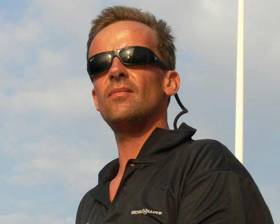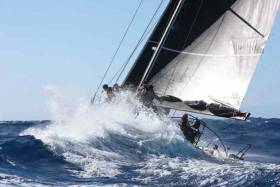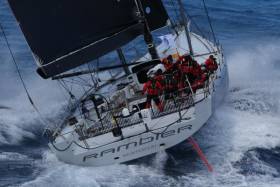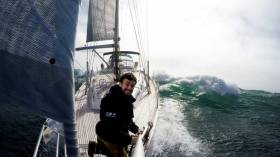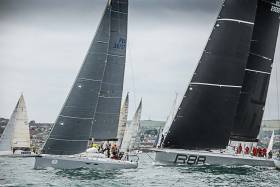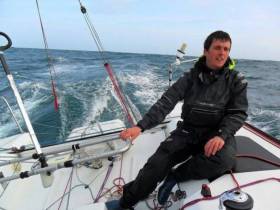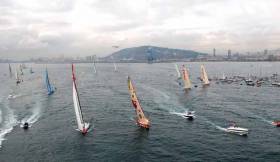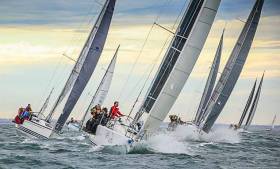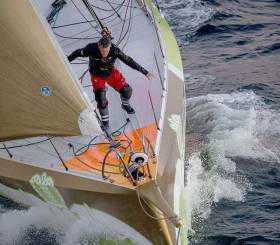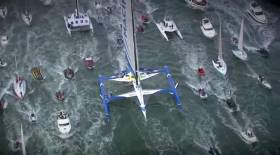Displaying items by tag: Offshore
Less than a fortnight after he’d been declared the Afloat.ie/Irish Sailing/Volvo Sailor of the Year 2017 in Dublin, Conor Fogerty of Howth Yacht Club was back on the podium in Antigua, having been declared runaway winner of Class 3 in the RORC Caribbean 600 2018.
Fogerty had experienced exceptionally heavy weather when he achieved his outstanding solo success of 2017 in winning the Gipsy Month Trophy in the OSTAR with his Sunfast 3600 Bam!. But far from being sunlit therapy to counteract memories of that experience, the 2018 sailing of the RORC Caribbean 600 was the toughest yet in all its ten years. However, Fogerty and his crew of Howth clubmates battled on to a huge class win and an exceptionally good overall placing for the second-smallest boat in the fleet in what was undoubtedly a big-boat race.
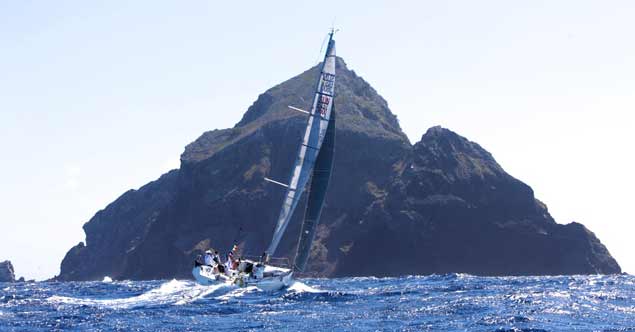 Conor Fogerty’s Bam! during one of the gentler stages on her way to a very clearcut win in Class 3 in the mostly rough RORC Caribbean 2018
Conor Fogerty’s Bam! during one of the gentler stages on her way to a very clearcut win in Class 3 in the mostly rough RORC Caribbean 2018
Rambler 88 Smashes RORC Caribbean 600 Course Record
George David’s magnificent Rambler 88 has added further lustre to a career of remarkable success by taking line honours and setting the new course record for the RORC Caribbean 600 by a margin of more than two hours this morning writes W M Nixon.
In 2011, when he was racing Rambler 100, David had set the previous record of 1 day 16 hours 20 minutes and 2 seconds in what seemed like wellnigh perfect conditions. But continuous and often vigorous northeast tradewind conditions this year gave Rambler 88 the edge, and she finished at Antigua at 01:21:45 local time in the small hours of this morning to set a new record of 1 day 13 hours 41 minutes and 45 seconds.
Unlike their Volvo Round Ireland Record in 2016, when there were no mono-hulls of comparable size chasing the winner, Rambler’s crew will not have to wait too long to see if she continues to hold the IRC Championship lead. She gives time to the American-owned Volvo 70 Volvo Warrior, which is just 28 miles from the finish and sailing to windward on the final leg at a VMG of 14.5 knots, though with barely enough time available to challenge Rambler 88.
The overnight IRC leader, Ron O’Hanley’s Cookson 50 Privateer, has now slipped to fourth overall as the German 56-footer Varuna has moved ahead to third in what is still very much a big boat race.
Thus the larger of the two Howth entries, the Michael Wright-chartered IRC 46 Pata Negra, has continued to improve through the night, and now lies 10th overall and second in Class 1. Kevin McLaughlin’s J/44 Spice, with NYC crewmen Will Byrne and Chris Raymond, is third in Class 1 and 12th overall.
Conor Fogerty’s 36ft Bam! (HYC) the smallest boat in the race, is punching above her weight at 13th overall, and leads Class 3 by an hour. But she still has 289 miles to race, facing the challenge of just how long this record-making nor’east breeze will last.
Race tracker here
Rambler 88 Breaks RORC Caribbean 600 Monohull Record
George David's American Maxi Rambler 88 crossed the finish line in Antigua on Wednesday 21st February at 01:21:45 AST in an elapsed time of 1 day 13 hours 41 minutes and 45 seconds, setting a new monohull race record.
Meanwhile, Paradox, Peter Aschenbrenner's American 63' Trimaran crossed the finish line in Antigua at: 00:55:16 AST on Wednesday 21st February 2018 in an elapsed time of 1 day, 13 hours 5 minutes and 16 seconds taking Multihull Line Honours in the 10th edition of the race.
Countdown for Dubliner to Become First Irish Man to Sail Non-Stop Single Handed Round the World
Gregor McGuckin (31) is attempting the gruelling feat of becoming the first Irish man to sail non-stop single handed around the world using no modern technology in the upcoming Golden Globe Race.
In 150 days, Gregor will set sail from Les Sables D’Olonne, France in what is one of sailing’s most extreme races. Competitors are restricted to 1960s technology meaning no GPS, no FaceTime, no iPod and no Kindle.
As one of the youngest competitors, Gregor will compete against 24 other sailors using just a compass, the moon and stars to guide him around the world.
“To be the first Irish person to sail around the world solo non-stop will be an amazing achievement, but I wholly believe that I have skill and determination to win the entire race,” said McGuckin.
Only 200 people have successfully sailed solo around Cape Horn, but for Gregor the biggest challenge will be surviving 270 days alone at sea and making sure that his boat can withstand the treacherous conditions.
Certainly, McGuckian, if he can complete the voyage, will join the ranks of few Irishmen to complete the solo circumnavigation – with stops and without – as Afloat.ie has previously reported here.
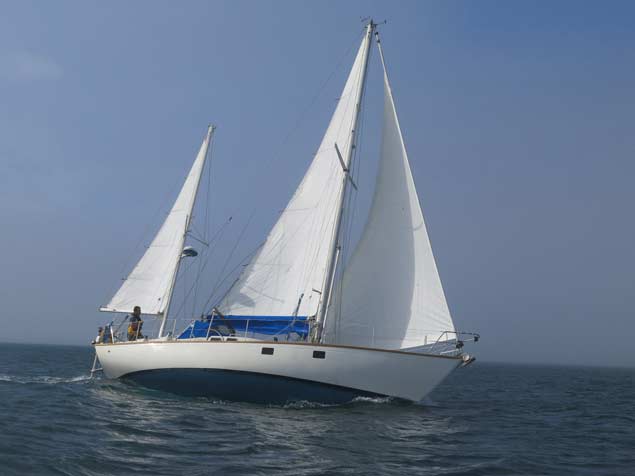 Gregor’s boat is a Biscay 36 Ketch, which is one of the most competitive models permitted.
Gregor’s boat is a Biscay 36 Ketch, which is one of the most competitive models permitted.
“The greatest challenge will not only be surviving without seeing another human being for nine months but finding the funding to make sure my boat is competitive as possible and can withstand the most extreme of storms.”
Gregor will have to carry all his food for nine months and find ways to catch rainwater to drink. He’ll have a sealed box with GPS in case of emergencies, but if he opens it he’ll be instantly disqualified.
There will be no communication with the outside world, only occasional communications with boats within radio distance and a weekly check in with the race centre.
2018 marks the 50-year anniversary of the Golden Globe Race, and only the second time in history that such a race has been attempted.
The new Colin Firth movie 'The Mercy' (released next week) is based on the original Golden Globe Race and follows the tragic tale of Donald Crowhurst. See a trailer for the movie here.
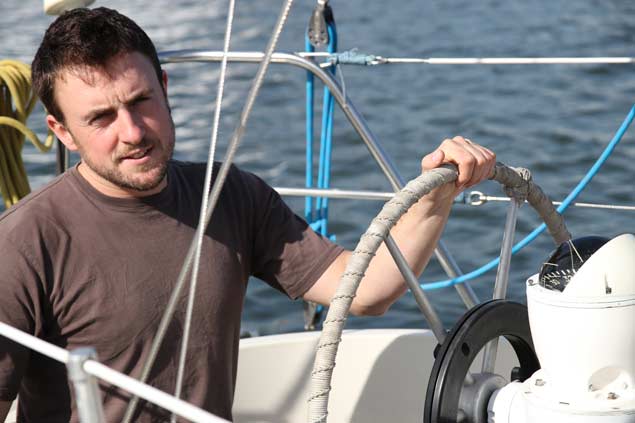 Gregor McGuckin at the helm of his Biscay 36 ketch
Gregor McGuckin at the helm of his Biscay 36 ketch
Golden Globe Race
The Golden Globe Race is a solo, non-stop, unassisted round-the-world sailing race via the three Great Capes of the Southern Ocean.
2018 marks the 50-year anniversary and the second running of the Golden Globe Race when Sir Robin Knox-Johnston became the first person to sail solo non-stop around the world.
This once-off event is unique as race entrants are restricted to using boats and equipment similar to that which was available for the original race in 1968.
During the race Gregor will navigate 30,000 miles solo non-stop without any GPS or other electronic instrumentation and will spend approximately 270 days at sea.
On completion, Gregor will become the first Irish person to complete a non-stop, solo circumnavigation of the world.
Gregor McGuckin
Raised in Goatstown, Gregor began sailing when studying Colaiste Dhulaigh. Originally a passionate windsurfer, Gregor moved to Mayo to pursue a career teaching watersports to children.
In 2013, Gregor moved to the south coast of the UK to train as a commercially endorsed Ocean Yachtmaster.
He’s logged approximately 50,000 miles as a yacht delivery skipper crossing the Atlantic and Indian Oceans many times.
At 31, he will be one of the youngest participants in the Race and will be one of only 200 people who have sailed solo around Cape Horn.
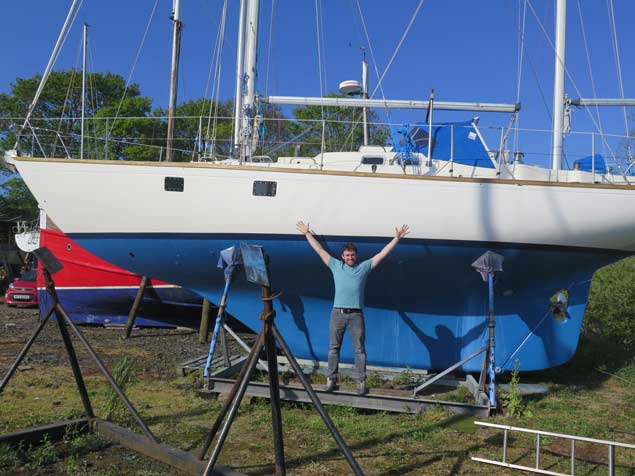 Gregor alongside his 36–foot ketch in Malahide
Gregor alongside his 36–foot ketch in Malahide
McGuckian's Boat
Gregor’s boat is a Biscay 36 ketch, which is one of the most competitive models permitted.
Currently, it is in Malahide Marina, Dublin and is being put through rigorous preparation and trials to ensure it is prepared for the journey ahead.
The Atlantic Anniversary Regatta is the first ever regatta series with two Atlantic Ocean races in both directions. Celebrating the 150th anniversary of the Norddeutscher Regatta Verein (NRV), based in Hamburg, Germany. The first part of this extraordinary series was completed in December 2017 with the 2017 RORC Transatlantic Race from Lanzarote to Grenada. The final part of the race series will see the fleet race 3500 nautical miles from Bermuda to Hamburg, starting on 8th July 2018 and it looks like top two sailors in the 2016 Round Ireland Race are favourties in the Anniversary Race too.
For the Bermuda to Hamburg race, George David's American Maxi Rambler 88, is the hot favourite for line honours but his Wicklow challenger from two years ago, Eric de Turckheim in a new 54ft Teasing Machine will also be in contention.
“The great attraction is to be racing on the ocean for so many days, and we have had good results rewarding our efforts, including two records and three fleet firsts.” Commented George David. “The NRV was the host club for Rambler 90s first transatlantic in 2007, and the club set a high bar for organization and hospitality, and we are confident of the same in 2018. The big challenge is keeping the boat together while still going fast. The best advice I can give newcomers to the race; be totally prepared for anything that may happen and sail safely.”
In three different yachts, all called Rambler, George David has raced west to east across the Atlantic on three occasions. In 2007, Rambler 90 took line honours in the HSH Nordbank Transatlantic (11d 16h 13m 59s). In 2011, Rambler 100 took line honours in the Transatlantic Race, establishing a race record (6d 22h 08m 2s). In 2015 Rambler 88 completed the Transatlantic Race winning IRC One (7d 16h 54m 46s). This will be George David's sixth transatlantic race in both directions.
Over 30 teams have expressed their interest to race from Bermuda to Hamburg, competing for Line Honours and under the IRC, ORC and ORCsy rating systems as well as one design Classes like IMOCA and Class 40. Confirmed entries include top performers from the 2017 RORC Transatlantic Race: Overall winner, Eric de Turckheim's Teasing Machine. Winner of the ORC Division, Outsider skippered by Dr. Harald Brüning. Winner of IRC One, Hamburgische Verein Seefahrt's Broader View Hamburg, and winner of the Class40 Division, Mathias Müller von Blumencron's Red.
Westport to Welcome Mini-Transat Star Tom Dolan
On Thursday January 25th, at 19:30hrs, Mayo Sailing Club will be hosting a public presentation in the Westport Coast Hotel’s Atlantic Suite by Mini-Transat sailor Tom Dolan, and the admission of just €2 includes tea, coffee and biscuits.
Originating on a farm near Kells, Co Meath, Tom Dolan had no background in sailing. He was never part of a yacht club, never went on sailing holidays and didn't get lessons as a child. When his father spotted an old wooden dinghy in Buy & Sell, the two of them set about fixing it up, and he first set sail on the local lake at the age of 10.
Since then, Tom has built up a very impressive Sailing CV. He has French, Irish and British qualifications and made his first crossing of the Atlantic at just 21 years of age. In 2016, he won the Mini en Mai and the Trophée MAP, becoming the first Irish person to win a race in France. In June, Tom podiumed at the Mini-Fastnet Race, despite having been fouled by a fishing net. That same month, he was second in the 500 Mini-en-Mai Race.
His latest achievement was coming in 6th in the Mini Transat 2017, Ireland’s best ever result in the race. This is a 4,000 mile race across the Atlantic where participants spend almost two months at sea, alone on a 21ft boat. The Mini Transat is considered by many to be one of the most extreme events in sailing considering the distance covered and the small size of the boats.
It promises to be an exciting as well as entertaining and informative evening as Tom talks about his entry into the sailing world, how the Mini Transat went, and provides an insight into his future adventures.
With 365 days to go until the start of the fourth edition of the Barcelona World Race (12th January 2019), Barcelona’s round the world event has issued the official document containing details of the key rules of the regatta.
This Notice of Race for the Barcelona World Race 2018/19 has been eagerly anticipated. Changes to racing dates, the competition format, which now has two legs and an option to change co-skipper in the second leg, are new features which mean the IMOCA calendar’s double-handed round the world event has a brand-new look.
- The Race Management team has unveiled the regatta’s key document, where the official rules for the fourth edition of the race are laid out.
- Two legs: Barcelona – Sydney – Barcelona and the option to change co-skipper for the second leg are the main changes in this new format for the double-handed, round the world regatta
- The winner will be decided based on points accumulated across the two legs.
- There will be a maximum of one technical stopover permitted on each leg of a minimum of 12 hours in length and a maximum of 48 hours.
The most significant changes set out in the document are as follows:
1. The deadline for registrations is the 30th September 2018.
2. The start will be given in Barcelona on the 12th January 2019, at 13:00 (GMT+1).
3. The official press conference will take place on the 10th January 2019 at 12:00 (GMT+1).
4. The start in Sydney of the second leg will be on the 9th March 2019.
5. All boats must start the second leg of the regatta no later than 48 hours after the official start of the leg is given.
6. A single technical stopover for repairs or medical assistance is permitted on each leg.
7. Final overall rankings for the Barcelona World Race 2018/19 will be calculated based on the sum of points gained across both legs.
ISORA Offshore Sailing Numbers Close to All Time High, 2018 Racing Schedule Announced
2017 was the best season for Irish Sea offshore racing (ISORA) in many years with 68 boats taking part in the 15-race series writes ISORA Chairman Peter Ryan. In 2016, 54 boats took part. To put these numbers in context, in 1978, when ISORA was in its “hey-day”, 70 boats raced with an average race entry of 32 boats. We are very close to this again and I am confident that those numbers will be exceeded in 2018.
The ethos of ISORA is to provide challenging and satisfying offshore and coastal races for its members and, just as importantly, provide a convivial social scene for those skippers and crews who take part. What is unique about the boats who participate in ISORA is that while they are extremely competitive during races the camaraderie that exists between all skippers and crew, ensures that assistance and encouragement is offered to competing boats at all times. Safety within the fleet is paramount.
A 15 race schedule is planned for 2018 that will include 7 offshore races, a 4-race coastal series on the Irish side and a 4-race coastal series on the UK side. The Round Ireland, although the offshore racing apex of the season, is not included in the overall ISORA Offshore Series but ISORA will be presenting prizes and trophies to ISORA boats taking part in this epic race.
The race schedule has been compiled to minimise clashes with other events and to work with these events where possible. To this end ISORA will be working with Liverpool and Tranmere Yacht Clubs on the Midnight Race, Howth Yacht Club on the Lambay Race and Wicklow Sailing Club on the Round Ireland. There is also a delivery race to the Spinlock IRC Welsh National Championship
ISORA will be running an offshore weekend on the 8th-10th June that, together with deliveries, will allow a boat and crew to qualify for the Round Ireland in one weekend. This weekend consists of the Midnight Race from Liverpool to Douglas on the Friday evening and a race from Douglas on the Sunday morning.
The full schedule advertised in the Afloat Irish Sailing Annual is downloadable below.
ISORA will be organising a pre-season coastal race on the 14th April from and back to Dun Laoghaire. Although not part of the ISORA Series, prizes will be presented after the race. It is hoped that this introductory race will attract new boats that have not yet taken part in ISORA. A party will be organised in the NYC after the race for all participants and members.
Anyone interested in entering ISORA or considering crewing on an offshore boats can contact Peter Ryan at [email protected]
Enda O'Coineen on Sailing Alone Round-the-World
“I’m that bad nobody would come with me….”
That’s what Enda O Coineen told me when he confirmed that he will be completing his round-the-world voyage which he started as part of the Vendee Globe Race, alone to complete the round-the-world solo voyage.
“Round the world with just one stop, forced upon me, not by choice, but I’m going to complete it. Maybe 50 days at sea when I leave New Zealand after circumnavigating it from Dunedin, but it’s a solo voyage and that’s my aim,” he said when we discussed the completion of his round-the-world sail.
It will be a year since his yacht, KIilcullen Voyage was dismasted during the Vendee Globe Race off New Zealand on New Year’s Day. The 61-year-old sailor spent five days of January getting the damaged yacht 240 miles with a temporary ‘jury rig’ towards safety off Dunedin from where he will restart.
“It will be challenging because there will be no race back-up this time, nor other boats in the racing fleet.”
I asked him why he was going to complete it alone. Listen to his response on my Podcast.
• Listen to ENDA O COINEEN on my weekly Podcast below
Single-Handed Round the World Sailing Record Smashed By Francois Gabart
Francois Gabart, who left Ouessant on 4 November 10:05 (UTC+1), crossed the finishing line of his solo round the world, located between Lizard Point and Ouessant, at 02:45 (French time, UTC+1) this 17 December. For his first attempt, the MACIF trimaran skipper establishes a new single-handed round the world record of 42 days, 16 hours, 40 minutes and 35 seconds, improving the time taken by Thomas Coville on 25 December 2016 (49 days, 3 hours, 4 minutes and 28 seconds) by 6 days, 10 hours, 23 minutes and 53 seconds.
His time is the second time outright in a round the world, crewed and single-handed combined. Only IDEC Sport (Francis Joyon) succeeded in achieving a better time in the Jules Verne Trophy (40 days, 23 hours, 30 minutes and 30 seconds). The MACIF trimaran will have covered a true distance of 27,859.7 miles, with a true average over this course of 27.2 knots.
During the round the world, Francois Gabart left a lasting impression on everyone by beating the reference times one by one on his way. The most significant ones were the distance sailed single-handed in 24 hours (851 miles between 13 and 14 November, against 784 miles, which was his own personal best), but also with crew and single-handed combined, on the Ouessant-Cape of Good Hope section (12 days, 20 hours and 10 minutes, the Pacific Ocean crossing (Tasmania to Cape Horn in 7 days, 15 hours and 15 minutes) and Cape Horn-equator (6 days, 22 hours and 15 minutes). (*subject to confirmation by the WSSRC)



























